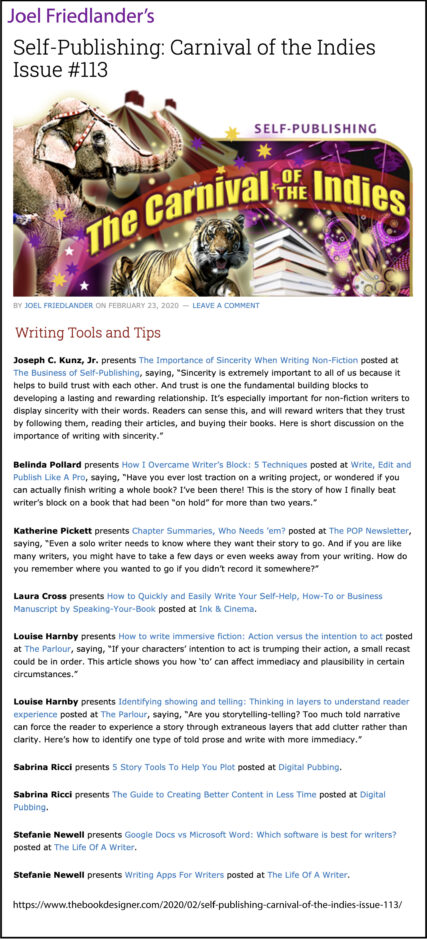The Importance of Sincerity When Writing Non-fiction
Archived series ("Inactive feed" status)
When?
This feed was archived on September 25, 2024 16:08 (
Why? Inactive feed status. Our servers were unable to retrieve a valid podcast feed for a sustained period.
What now? You might be able to find a more up-to-date version using the search function. This series will no longer be checked for updates. If you believe this to be in error, please check if the publisher's feed link below is valid and contact support to request the feed be restored or if you have any other concerns about this.
Manage episode 309359529 series 3031750
Updated December 27, 2022
Subtitle
Sincerity will help you build a following of readers that will respect you and what you do, which will help you sell more books
Synopsis
Sincerity is crucial to all of us because it helps build trust. And faith is one of the fundamental building blocks to developing a lasting and rewarding relationship. Non-fiction writers need to display sincerity with their words. Readers can sense this and reward writers they trust by following them, reading their articles, and buying their books. Here is a short discussion on the importance of writing with sincerity.

What You Will Learn
1. You’ll learn why sincerity is vital to non-fiction writing.
2. You’ll learn how to define and understand sincerity.
3. You’ll learn about the critical connection between sincerity and tone in your writing.
Introduction
Sincerity is crucial to all of us because it helps build trust. And faith is one of the fundamental building blocks to developing a lasting and rewarding relationship. Non-fiction writers need to display sincerity with their words. Sincerity, honesty, and respect for the subject matter and the reader are essential to building up a tribe of followers, readers, and buyers.

One of the main ways non-fiction writers display sincerity is by being transparent, straightforward, and honest with their readers. Readers can quickly sense this and reward writers they trust by following them, reading their articles, and buying their books.
Your writing voice, and the connection you make with your reader, are heavily influenced by your sincerity for the subject matter, your desire to help the reader, and the tone you use when you write.

Here are three terms you must understand in order to write with sincerity:
Term # 1. Writing voice refers to when your writing reflects your personality and characteristics. The tone you use helps reveal how you feel about the topic you are writing about and how you think about the reader. Your writing voice will help your readers understand and connect with you emotionally.
Term # 2. Sincerity means having no pretense, deceit, or hypocrisy. And, for example, being honest, genuine, truthful, open, transparent, and candid with the reader. Sincerity should never be faked or feigned because, for your readers to believe what you’re writing about, they must genuinely believe that you’re being honest with them.
To write with sincerity, you must first respect yourself, the subject matter, and, more importantly, the reader. Once you lose the reader’s respect, they’ll never come back to you to read your articles, or buy your books, ever again. Readers, especially today, can detect hypocrisy a mile away.
Term # 3. Tone: reflects your attitude toward your subject matter AND your attitude toward the reader and will significantly influence how your readers interpret your message. Tone refers to your perspective, such as formal, informal, ironic, serious, sophisticated, comedic, sarcastic, sad, dark, or cheerful.

Conclusion
Sincerity is one of the fundamental building blocks to developing trust between you, the writer, and your readers. One of the main ways non-fiction writers display sincerity is by being transparent, straightforward, and honest with their readers.
Your writing voice helps convey your seriousness and attitude toward the subject matter and your sincere desire to help the reader. All of this will help you build a following of readers that will respect you and what you do, which will help you sell more books.
Questions to Think About
1. What specific techniques have you used to improve your writing voice?
2. What are some changes you’ve made to your writing tone?
100 episodes




